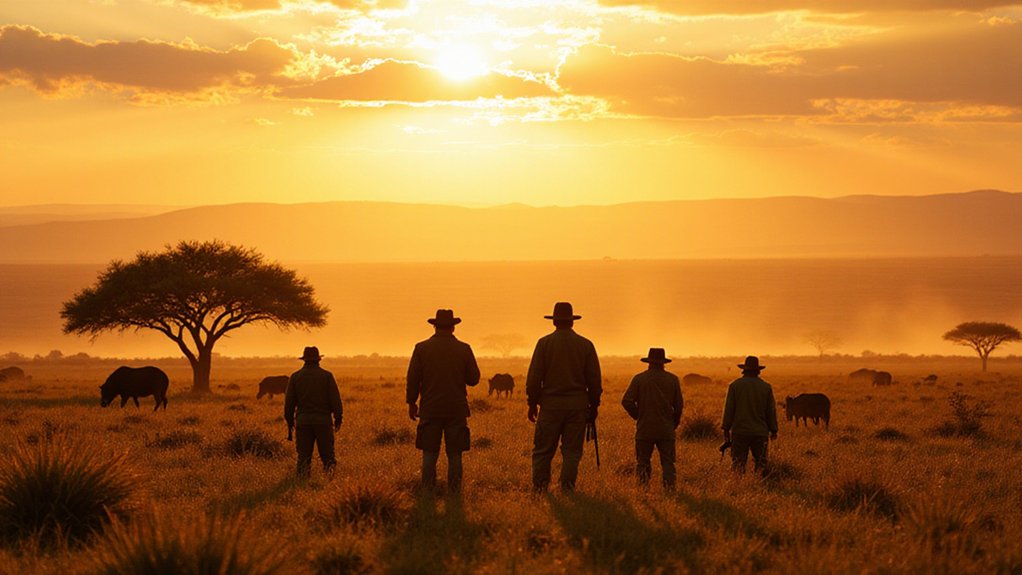Hunting tourism offers a unique blend of adventure and nature, appealing to both seasoned hunters and newcomers alike. As you explore various landscapes, you’ll also engage in wildlife conservation efforts. But what factors are driving its rising popularity? Understanding this niche can reveal not only the thrill of the hunt but also its broader implications. Let’s examine what makes hunting tourism a compelling choice for outdoor enthusiasts and local communities.
What is Hunting Tourism?
Hunting tourism is an exhilarating blend of adventure and nature, where enthusiasts travel to experience the thrill of hunting in diverse landscapes.
You’ll find yourself in remote forests, vast plains, or rugged mountains, pursuing game animals while immersing in local cultures.
This form of tourism combines excitement with the opportunity to connect with nature and wildlife conservation efforts.
Guided hunts often enhance the experience, providing expert knowledge and ensuring safety.
Whether you’re a seasoned hunter or a curious novice, hunting tourism offers a unique way to explore the great outdoors while participating in a centuries-old tradition.
Why is Hunting Tourism Gaining Popularity?
Why is hunting tourism becoming more appealing to adventurers and nature lovers alike?
It offers a unique blend of thrill and connection to nature. You get to experience breathtaking landscapes while pursuing game in their natural habitats. Many seek the challenge of honing their skills, making it a fulfilling adventure.
Plus, guided hunts provide safety and expertise, enhancing your experience. With growing awareness of sustainable practices, you can also engage in ethical hunting that respects wildlife populations.
It’s not just about the hunt; it’s about building lasting memories and forging a deeper appreciation for the outdoors, drawing you back time and again.
How Does Hunting Tourism Impact Local Economies?
As adventurers flock to remote regions for hunting tourism, local economies often see a significant boost.
You’ll notice an influx of spending in various sectors, including accommodations, restaurants, and local shops. Hunters typically pay for guided tours, licenses, and equipment rentals, creating jobs for guides and support staff.
This economic activity can also fund conservation efforts, benefiting wildlife and habitats. Additionally, communities may invest in infrastructure improvements, enhancing overall quality of life.
What Are the Ethical Considerations in Hunting Tourism?
What ethical dilemmas arise when engaging in hunting tourism? You might encounter several concerns that challenge your values and beliefs.
Consider these key points:
- Animal Welfare: Is the hunt fair and humane, or does it promote unnecessary suffering?
- Conservation Impact: Does your participation support sustainable practices, or does it contribute to wildlife decline?
- Local Community Rights: Are local people benefiting from this tourism, or are their rights being overlooked?
Understanding these considerations is vital. It helps you make informed choices about your involvement in hunting tourism and its broader implications.
How to Choose the Right Hunting Tourism Destination?
Choosing the right hunting tourism destination requires careful consideration, especially if you want to guarantee a rewarding experience while aligning with your values.
Start by researching the types of game available and the hunting methods employed. Evaluate the destination’s commitment to conservation and ethical practices. Look for reviews from fellow hunters to gauge satisfaction levels.
Consider accessibility and the quality of accommodations, as comfort plays a vital role in your overall experience. Finally, factor in local customs and regulations to guarantee a smooth trip.
What Regulations Should You Know About Hunting Tourism?
Before you commence on a hunting tourism adventure, it’s essential to familiarize yourself with the regulations that govern hunting in your chosen destination.
Different countries and regions have unique laws, and knowing them can enhance your experience while guaranteeing compliance.
Here are key regulations to keep in mind:
- Licensing Requirements: Guarantee you have the appropriate hunting licenses and permits.
- Species Restrictions: Be aware of which animals are permitted for hunting and any seasonal limitations.
- Safety Regulations: Familiarize yourself with safety protocols and local hunting practices to guarantee a secure experience.
Understanding these regulations helps you enjoy a responsible and successful hunting trip.
How to Prepare for a Hunting Tourism Adventure?
Preparing for a hunting tourism adventure involves more than just packing gear; it requires careful planning to guarantee a smooth experience.
Start by researching your destination and understanding local regulations. Confirm your hunting license and permits are valid.
Create a checklist of essential gear, including clothing suitable for the environment, appropriate weapons, and safety equipment. Don’t forget your first-aid kit and any personal items you might need.
Arrange accommodations and transportation in advance to avoid last-minute stress.
Finally, consider hiring a local guide who knows the area and can enhance your experience while ensuring safety and compliance with local laws.
What Are the Best Practices for Responsible Hunting Tourism?
How can you assure your hunting tourism experience is both enjoyable and responsible?
Start by following these best practices:
- Choose ethical operators: Research guides who prioritize conservation and sustainable practices.
- Respect local laws: Familiarize yourself with hunting regulations in the area to assure compliance and safety.
- Practice fair chase: Aim for a fair hunt by avoiding baiting and assuring a clean shot.
